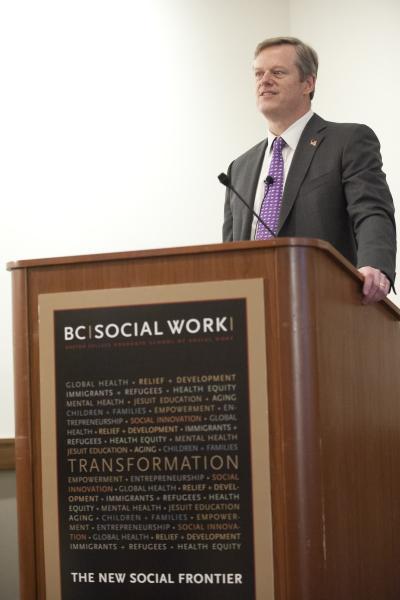The Affordable Care Act has a lot of costs and requirements that don't seem to make sense - requiring that plans include maternity coverage for post-menopausal women and single men comes to mind - and adding social workers into health care teams would seem to be another example of that.
Not so, said former Harvard Pilgrim Health Care CEO and current gubernatorial candidate Charles D. Baker Jr., keynote speaker at the Boston College Graduate School of Social Work Forum "Health Care Reform: From Policy to Practice", who believes that the social workers in his audience were going to bring an expansive view of care options under a "team-based care" approach.
"When I think of social workers, I think of problem-solvers," Baker said before lauding their abilities to "stitch clinical and social service issues together with real-life implications.
"They deal with the complexity of problems that don't fit neatly into categories."

Gubernatorial candidate Charles D. Baker Jr. discusses changes ahead for social workers during the Boston Graduate School of Social Work Forum "Health Care Reform: From Policy to Practice." Credit: Frank Curran/Boston College
Baker said he wanted to offer his views on the ACA's impact on social work and social workers, particularly in the areas of care management and therapy. A former Massachusetts' Secretary of Health and Human Services, Baker identified the expansion of coverage, the creation of health exchanges and cuts in Medicare as the "three big pieces" of ACA that would offer challenges and opportunities for social workers.
For example, expanded coverage would make more people eligible for care and treatment, he said, but also create potential dilemmas for what services can be provided, and in which form. Given this scenario, Baker strongly endorsed an emphasis on team-based approaches to health care issues, with specifically defined roles for each health care professional involved, and with measurement of outcomes built into the system.
Social workers would be a vital part of such cross-disciplinary work, he said, because their training tends to prepare them for a team-based approach better in comparison to other professions. "If everyone has a role, and if everyone plays a role, good things happen. This is a tremendous opportunity for all of you."
Baker said social workers and other health care professionals must endeavor to change a model in which 50 percent of health care dollars are spent by a "reasonably healthy" 95 percent of the population, and the remaining 50 percent by a five percent who "are really sick and pinball all over the system." He urged social workers to consider new, seemingly out-of-the-box solutions for longstanding problems, and to seek viewpoints from outside their profession – "people who don't see the elephant the same way you do."
Baker also said social workers should consider whether the culture of their particular organization or agency is attuned to problem-solving and team-based approaches. "Culture matters. Culture will crush strategy, always," he said.
His last piece of advice: "Trust your gut, but don't ignore data."




Comments